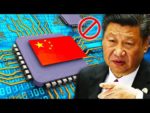Normalized image log-slope (NILS) is probably the single most essential metric for describing lithographic image quality. It is defined as the slope of the log of intensity, multiplied by the linewidth [1], NILS = d(log I)/dx * w = w/I dI/dx. Essentially, it gives the % change in width for a given % change in dose. This is particularly… Read More
Lithography Resolution Limits: The Point Spread Function
The point spread function is the basic metric defining the resolution of an optical system [1]. A focused spot will have a diameter defined by the Airy disk [2], which is itself a part of the diffraction pattern, based on a Bessel function of the 1st kind and 1st order J1(x), with x being a normalized coordinate defined by pi*radius/(0.5… Read More
Sino Semicap Sanction Screws Snugged- SVB- Aftermath more important than event
-Reports of further tightening of China SemiCap Restrictions
-Likely closing loopholes & pushing back technology line
-Dutch have joined, Japan will too- So far no Chinese reaction
-SVB is toast but repercussions may be far worse
Reports of tightening semiconductor sanctions on Friday
It was reported byBloomberg of Friday… Read More
Resolution vs. Die Size Tradeoff Due to EUV Pupil Rotation
The many idiosyncrasies of EUV lithography affect the resolution that can actually be realized. One which still does not get as much attention as it should is the cross-slit pupil rotation [1-3]. This is a fundamental consequence of using rotational symmetry in ring-field optical systems to control aberrations in reflective… Read More
KLAC- Weak Guide-2023 will “drift down”-Not just memory weak, China & logic too
-Business will “drift down” over the course of 2023
-Not just memory is weak- China issue, foundry/logic slowing
-March guide worse than expected (Like Lam)
-Backlog likely saw push outs & cancelations but still long
Good quarter but weak guide
Much as we saw with Lam, KLA reported a beat on the December quarter… Read More
U.S., Japan & Dutch versus China Chips & Memory looks to be in a long downturn
-US, Japan & Dutch agree to embargo some China chip equip
-Goes beyond just leading edge & will increase negative impact
-China might catch up in decades or invade Taiwan tomorrow
-Why the memory downturn could be longer than expected
Ganging up on China
It appears that the US has put together a coalition of the US, Japan and… Read More
Multiple Monopole Exposures: The Correct Way to Tame Aberrations in EUV Lithography?
For a leading-edge lithography technology, EUV (extreme ultraviolet) lithography is still plagued by some fundamental issues. While stochastically occurring defects probably have been the most often discussed, other issues, such as image shifts and fading [1-5], are an intrinsic part of using reflective EUV optics. However,… Read More
ASML – Powering through weakness – Almost untouchable – Lead times exceed downturn
-Demand far exceeds supply & much longer than any downturn
-Full speed ahead-$40B in solid backlog provides great comfort
-ASP increase shows strength- China is non issue
-In a completely different league than other equipment makers
Reports a good beat & Guide
Revenues were Euro6.4B with system sales making up Euro4.7B… Read More
Application-Specific Lithography: Sub-0.0013 um2 DRAM Storage Node Patterning
The pursuit of ever smaller DRAM cell sizes is still active and ongoing. DRAM cell size is projected to approach 0.0013 um2 for the D12 node. Patterning challenges are significant whether considering the use of DUV or EUV lithography. In particular, ASML reported that when center-to-center values reached 40 nm, single patterning… Read More
Secondary Electron Blur Randomness as the Origin of EUV Stochastic Defects
Stochastic defects in EUV lithography have been studied over the last few years. For years, the Poisson noise from the low photon density of EUV had been suspected [1,2]. EUV distinguishes itself from DUV lithography with secondary electrons functioning as intermediary agents in generating reactions in the resist. Therefore,… Read More












TSMC Process Simplification for Advanced Nodes